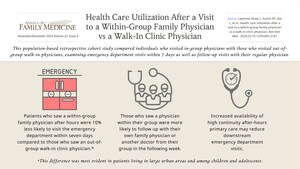Annals of Family Medicine: COVID-19 Pandemic Triggers a Dramatic Decline in Diagnoses of Cardiovascular Risk Factors, Chronic Diseases and Some Cancers
ANN ARBOR, Mich., Jan. 25, 2022 /PRNewswire/ -- New diagnoses of cardiovascular risk factors, common chronic conditions and some cancers have dramatically declined during the COVID-19 pandemic, according to a study recently published online in Annals of Family Medicine.
Researchers note that the decline is not reflective of improved health outcomes but suggests that people are not receiving appropriate and timely health screenings that would diagnose these conditions early, when there is a greater chance of effective treatment and good health outcomes.
Researchers in Spain analyzed annual incidence rates of the main cardiovascular risk factors, chronic diseases, and some cancers in 2020, compared with data from 2017-2019. They found a reduction in newly reported diagnoses ranging from a 36% decline for high cholesterol diagnoses to a 50% decline in the diagnosis of pulmonary diseases such as chronic bronchitis and emphysema.
Comparing data from 2017-2019, the team found in 2020 significant reductions in the annual incidences of high blood pressure (40%), type 2 diabetes (39%), chronic kidney disease (43%), coronary heart disease (48%), non-cancerous enlarged prostate (38%), osteoporosis (40%), under-active thyroid (46%), non-cancerous colon polyps and tumors (42%), and serious forms of skin cancer (45%).
Additionally, the rate of diagnosis of anxiety disorders increased by 16% while the diagnoses of alcohol use disorder decreased by 46%.
The researchers believe that the decline of face-to-face patient visits for preventive and health promotion services in response to the ongoing COVID-19 pandemic is largely responsible for this alarming trend. Prioritization of COVID-19 care changed the physician-patient relationship to the detriment of face-to-face scheduled visits for chronic disease detection and monitoring, which fell by almost 41%.
"Returning to the level of detection and control of chronic diseases before the pandemic will require a substantial increase in primary care physicians and nurses; a return to face-to-face visits; a reorganization of telehealth; and the promotion of proactive care in patients who have the greatest comorbidities," the authors write.
The Impact of the COVID-19 Pandemic on Primary Health Care Disease Incidence Rates: 2017 to 2020
Antoni Siso-Almirall, MD, PhD, et al.
Conscorci d'Atencio Primaria de Salut Barcelona Esquerra (CAPSBE), Barcelona, Spain
SOURCE Annals of Family Medicine

WANT YOUR COMPANY'S NEWS FEATURED ON PRNEWSWIRE.COM?
Newsrooms &
Influencers
Digital Media
Outlets
Journalists
Opted In





Share this article